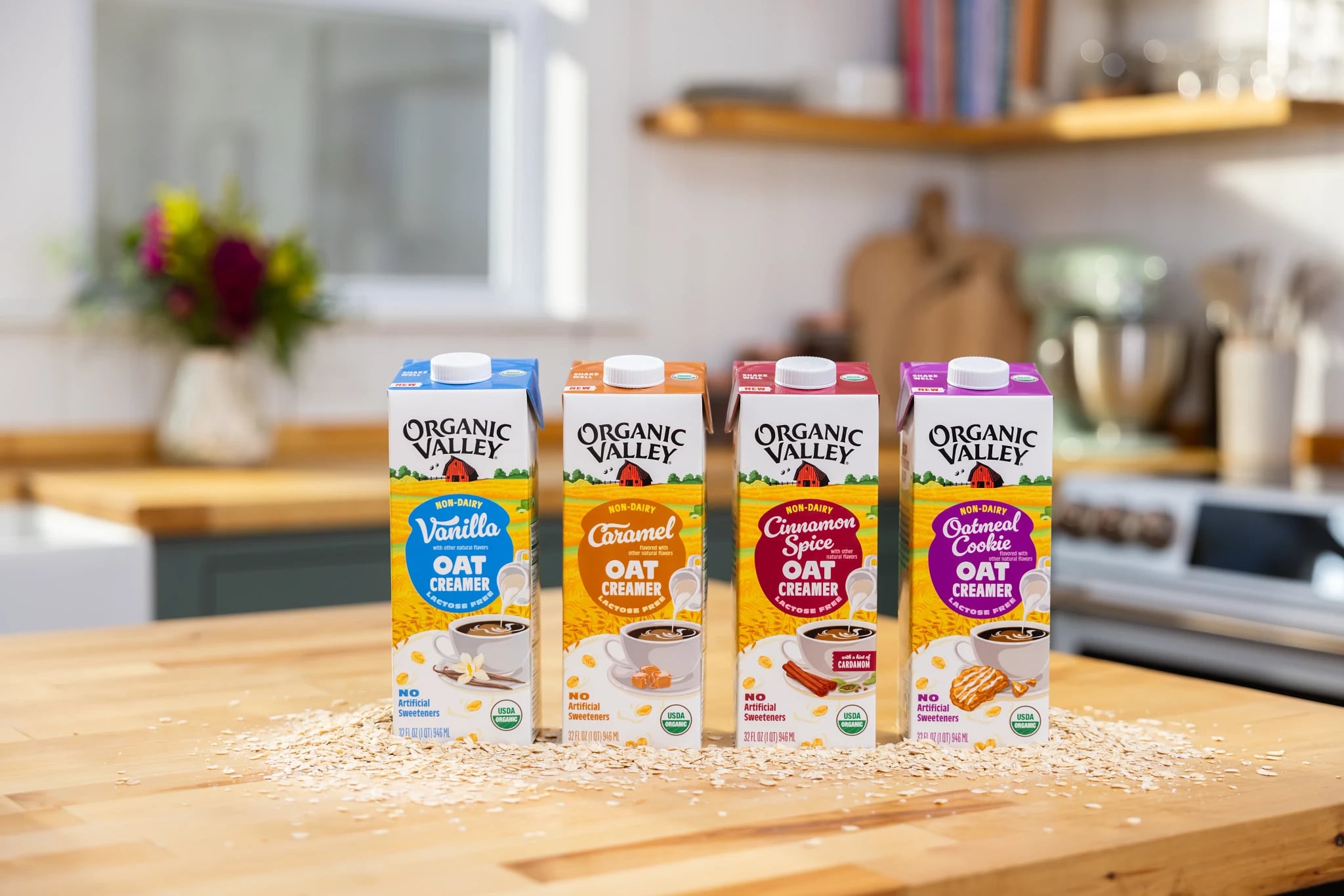Organic Valley, known for its dairy and meat products, expanded into the plant-based category with the debut of its oat-based creamers, which align with the company’s existing sustainability initiative to source directly from its family farm partners.
The move into plant-based aligns with the brand’s mission to “support organic family farms and promote sustainable agriculture” by sourcing organic oats “directly” from its family farm partners, ensuring integrity and quality “from crop to carton,” explained Dawn Burns, marketing manager at Organic Valley.
“By sourcing organic oats directly from our farmer members in the Heartland of the United States, we ensure the integrity and quality of our products while giving our farmers opportunities to diversify their income. This approach not only supports the farmers' economic stability but also promotes sustainable farming practices that work in harmony with nature,” Burns explained.
The company’s foray into oat-based creamers was also driven by consumer and market trends, where many of Organic Valley’s “loyal milk buyers” were also purchasing plant-based beverages, Burns added.
“Consumer insights and market trends were key in our decision. The plant-based milk category has been growing rapidly, driven by more people looking for dairy alternatives due to dietary preferences, environmental concerns and health benefits. Oat milk has become really popular because of its creamy texture, neutral taste and lower environmental impact compared to other plant-based beverages,” she said.
Consumers “are driven by a desire for different nutritional profiles, flavors and uses in various recipes,” Burns said.
Organic Valley’s 32-ounce oat creamers are available in four flavors – Vanilla, Caramel, Oatmeal Cookie and Cinnamon Spice – and contain no GMOs, pesticides or herbicides and follow the USDA National Organic Program standards, according to the company.
The company’s decision to source from organic farmers “helps protect the environment and ensures that our consumers receive products that are both nutritious and ethically produced,” Browns said.
Achieving consumer expectations for flavor, texture and frothing characteristics was an “adventure” for Organic Valley, Burns said.
“One of the main challenges was making sure our creamers had that smooth, creamy texture and that the flavor really came through in all types of coffee and tea. This meant we had to get creative and innovative with our oat processing technology to achieve the perfect consistency and frothing capabilities,” she said.
Additionally, the company was challenged with creating flavors that would differentiate itself from competitors while appealing to consumers.
“We chose unique flavors, like oatmeal cookie and cinnamon spice with a hint of cardamom, based on consumer insights and market trends. We wanted to capture market share through flavor innovation, offering something new and exciting to those seeking delicious and unique options for their coffee and tea,” Burns added.
Trends driving plant-based creamers
Within plant-based milks, oat milk is often considered to have a lower environmental impact, “which makes it appealing to eco-conscious consumers,” Burns said.
“With increasing awareness of lactose intolerance and dairy allergies, many people are looking for dairy-free alternatives. We offer both dairy and oat lactose-free options to meet these preferences. Additionally, health-conscious consumers are always on the lookout for products that offer nutritional benefits without compromising on taste and texture,” she added.
Organic Valley intends for its oat milk creamer to stand out by leveraging its heritage and values as a brand that prioritizes ethically and sustainably sourced ingredients that strengthen consumer trust and loyalty, Burns said.
“Our deep roots in dairy and commitment to supporting organic family farms have shaped our approach to the plant-based category. By communicating these values, we can strengthen our connection with consumers and show them what makes us special,” she said.
“Our approach not only supports the economic stability of our farmers but also promotes sustainable farming practices that are in harmony with nature,” she added.
Along with standout flavors and sustainability initiatives, nutritional enhancements like proteins, vitamins and minerals that enhance the nutritional profile comparable to dairy milk can also appeal to health-conscious consumers, Burns advised.


